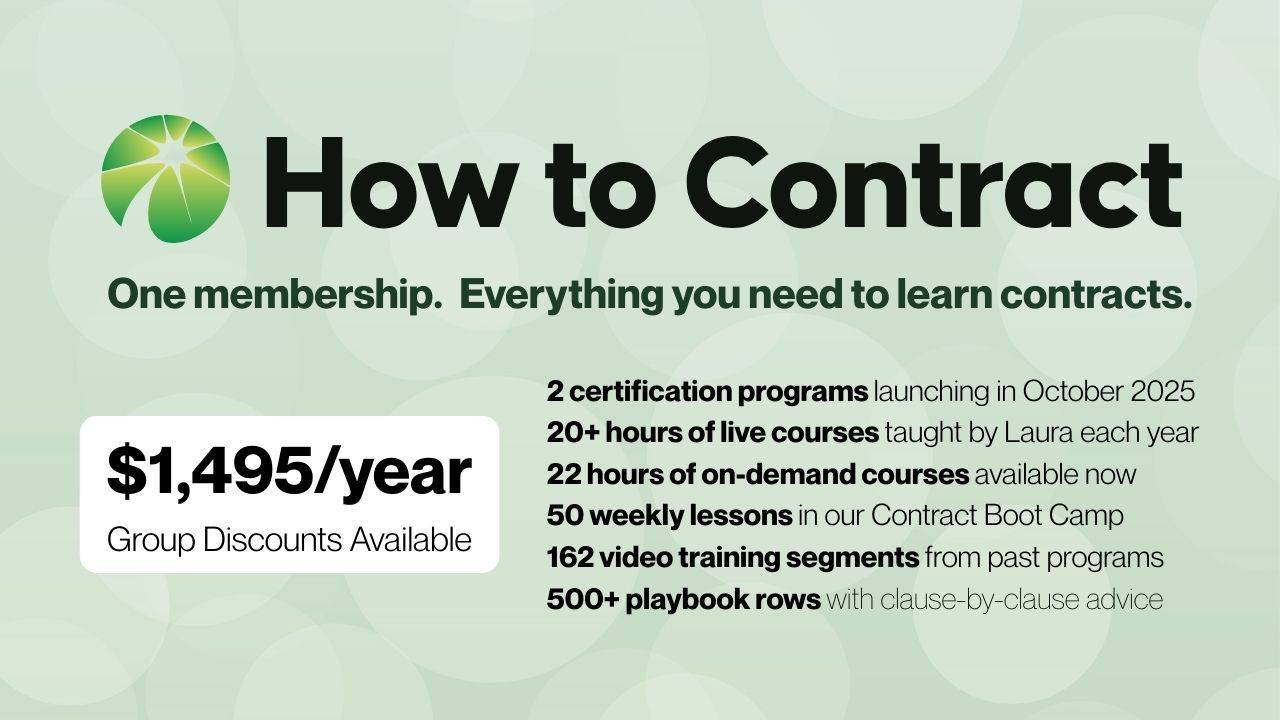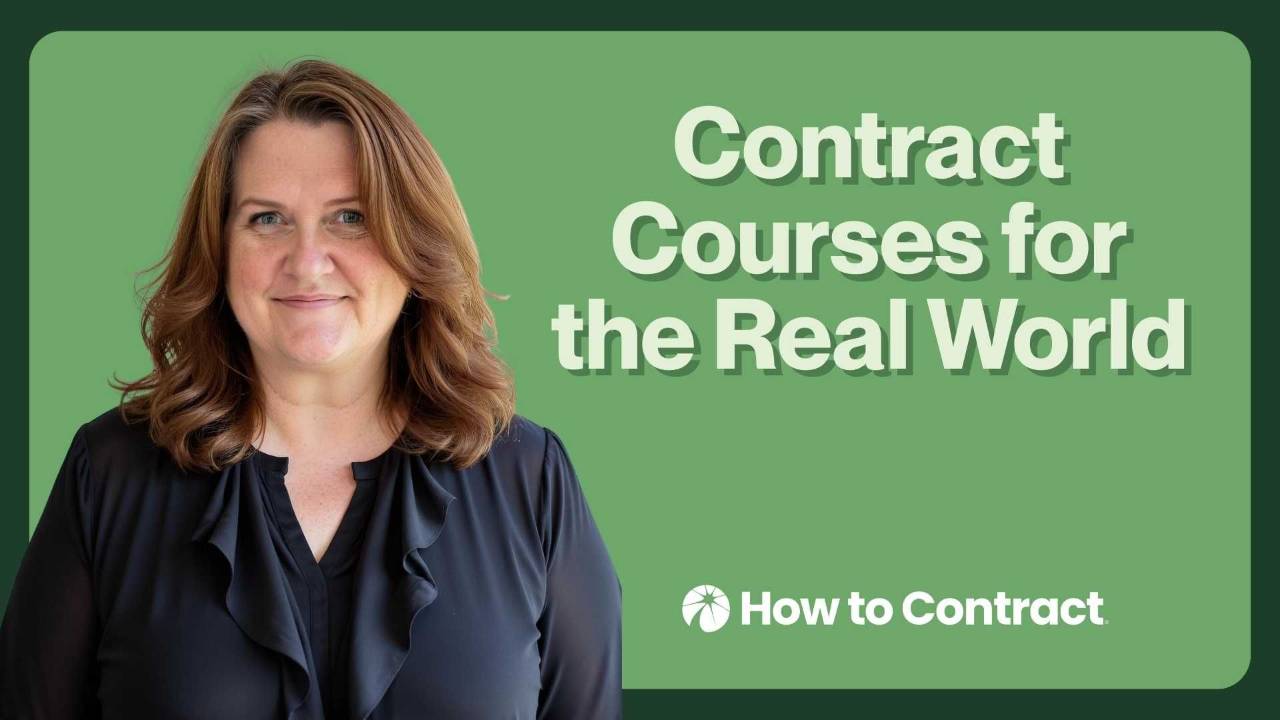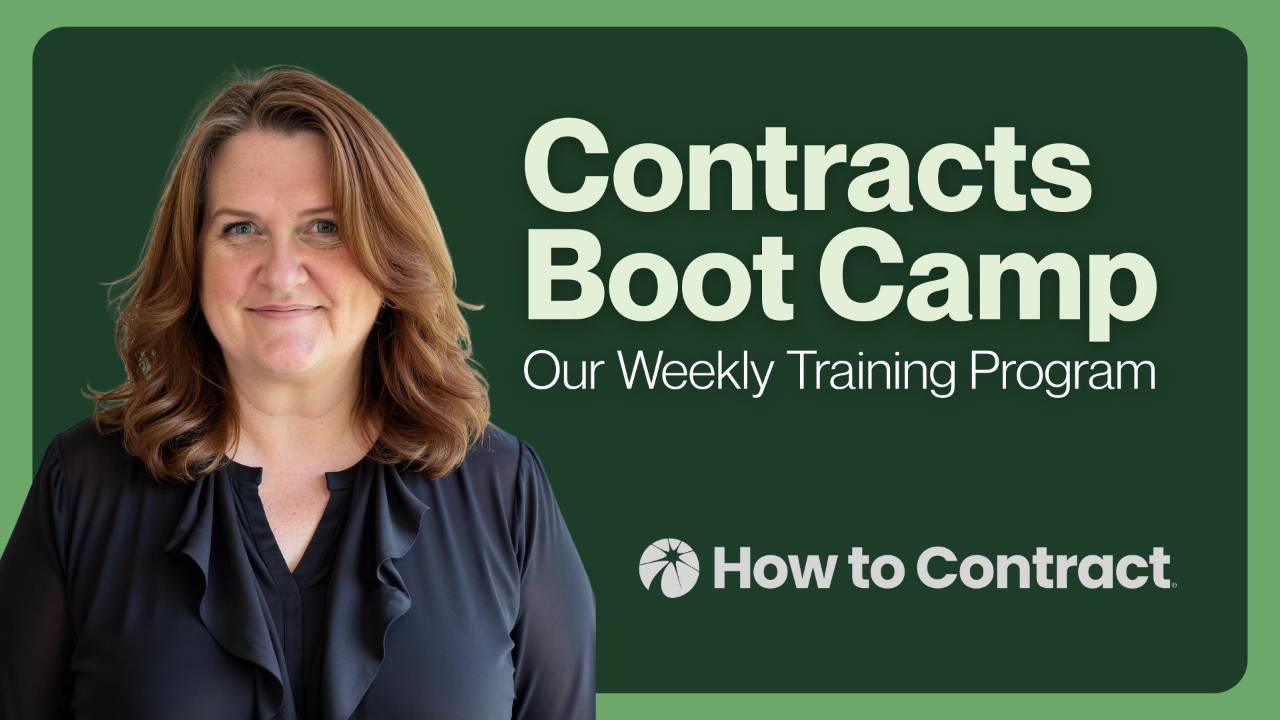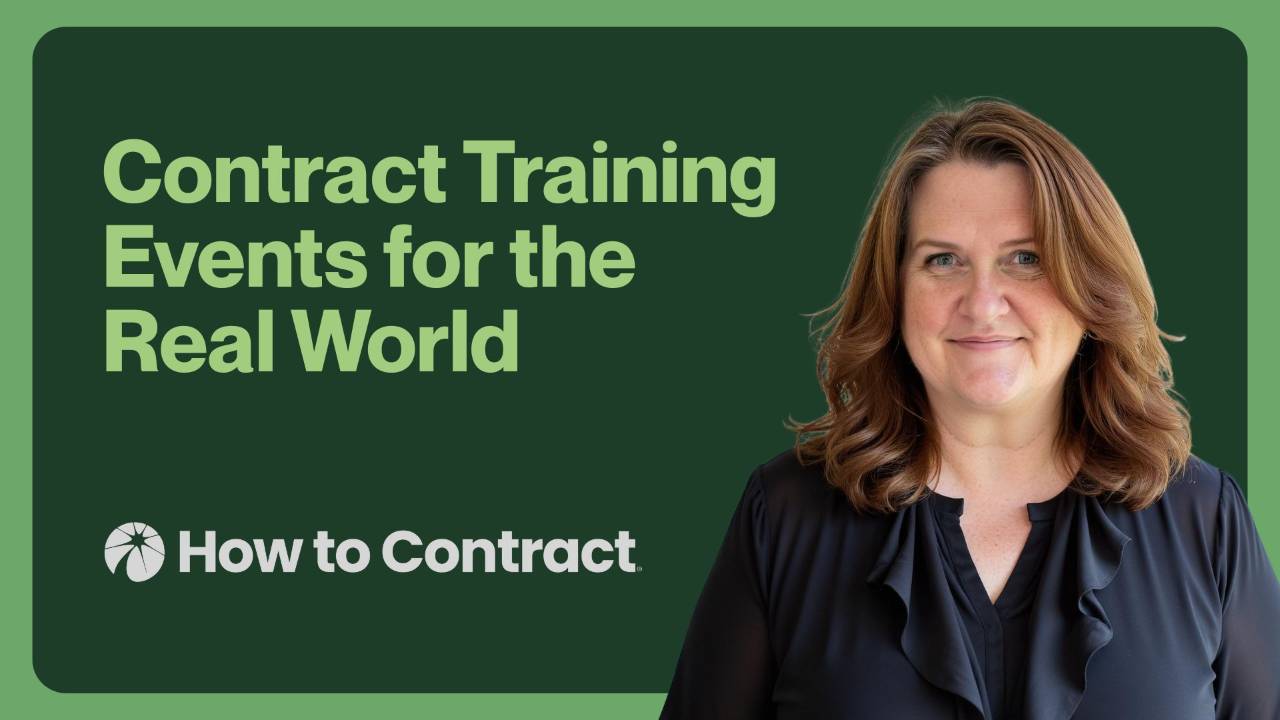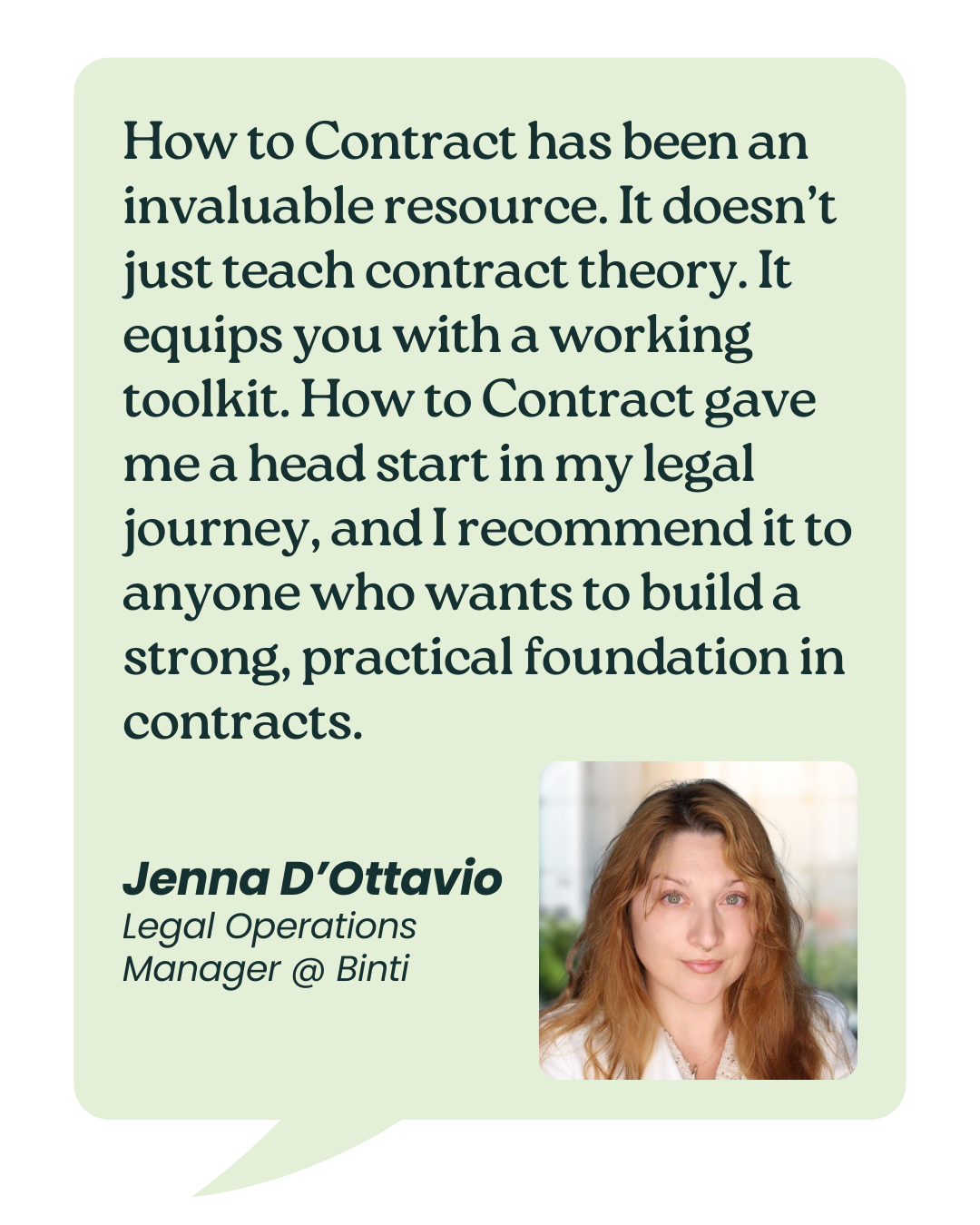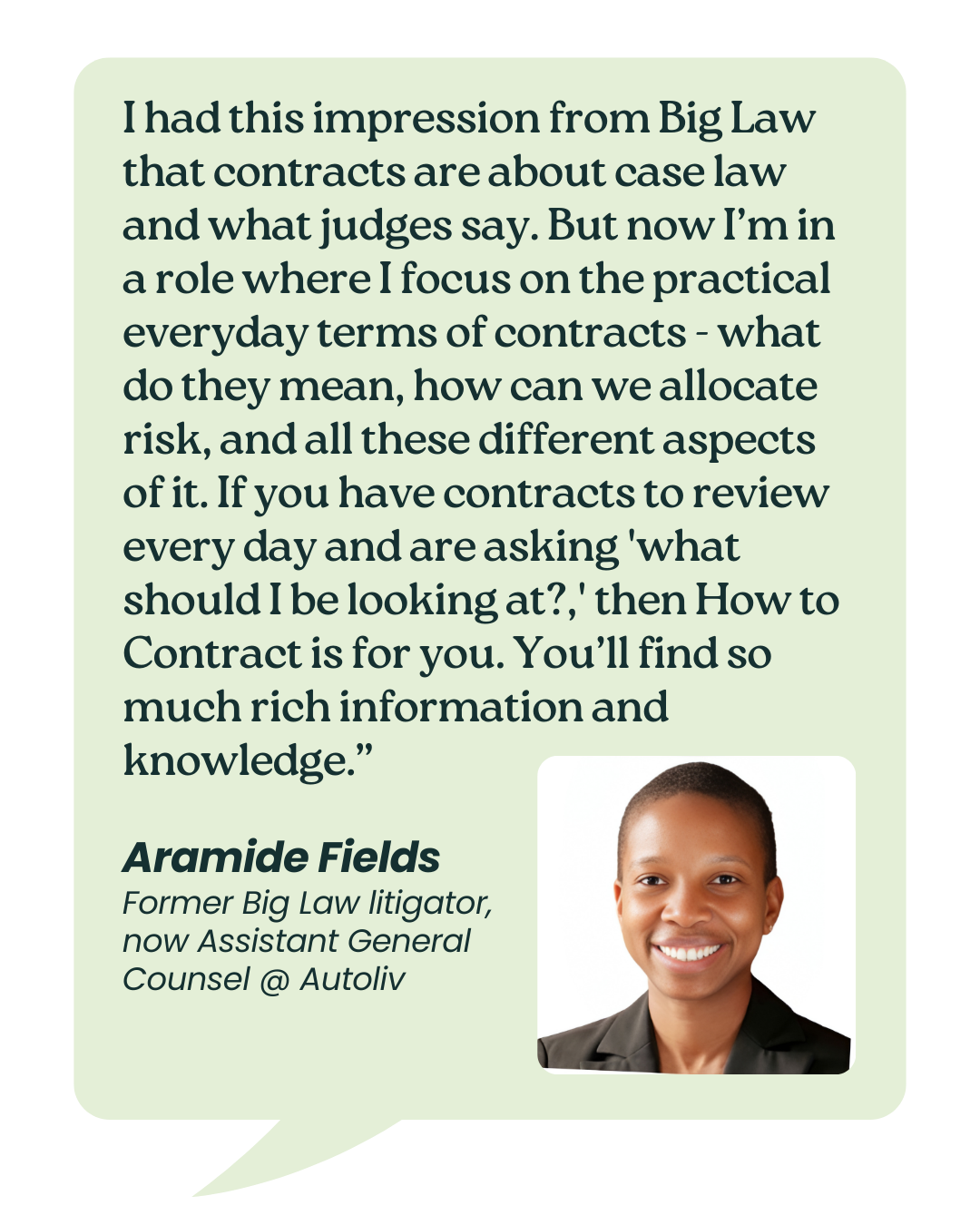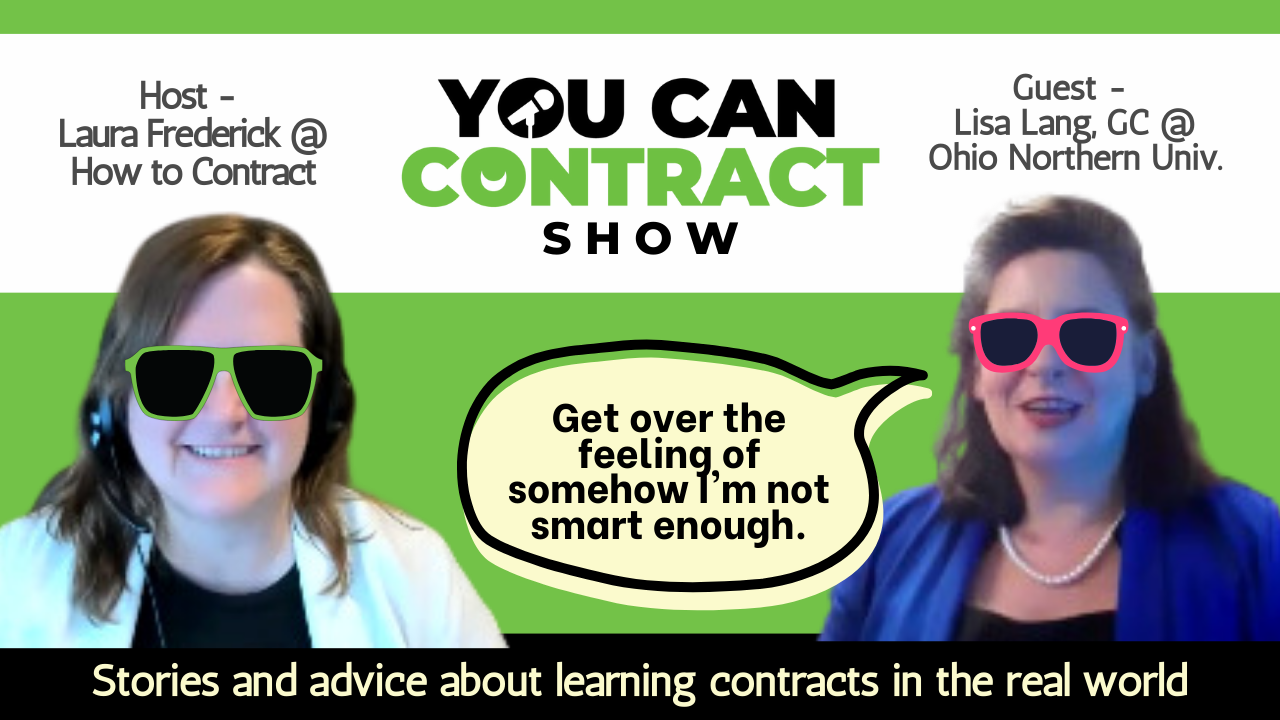
You Can Contract Show: Building Confidence and Contract Skills With Lisa Lang
This is the full transcript of You Can Contract's episode featuring Lisa Lang, General Counsel of Ohio Northern University, and a contributor to Above the Law.
Lisa talks about her experience learning contracts and the advice she has for others, including the power of admitting you don't understand something, ways to overcome imposter syndrome, and two tips for reducing anxiety when you're new to contracts.
Please note: this is an automatically generated transcript. Please allow for some imperfections.
Laura Frederick: Welcome Lisa.
Lisa Lang: Thanks, Laura. Happy to be here.
Laura Frederick: I'm so excited to have you on. A lot of us, of course, know you from all your activity on LinkedIn and your column in Above the Law. You've done so much to help the legal community and give back. Appreciate that. And of course, you were one of my co-hosts at ContractsCon this past February.
Lisa Lang: It was a blast and I can't wait to do more of it. I know, I, me too. Me too.
Laura Frederick: Tell us a little bit about yourself and where you're working these days.
Lisa Lang: So I have been practicing law for about 20 years and I have been all over the place. The short answer is I started as a paralegal in the military and then I went and became a civilian paralegal, and I transitioned into private practice and I worked there as both a paralegal and then as an associate attorney. Then I went into government practice. And then I started working for universities. So and that is where I am today. I'm at a private university in Ohio right now.
Laura Frederick: That's awesome. So let's start. Tell me about your law school experience taking contracts. Did you get exposure to contracts or transactions during law school?
Lisa Lang: Yeah. Thinking back, there's really [00:02:00] not much to tell. The only thing I really remember is Contracts 1 and Contracts 2, and it wasn't about drafting contracts. It was all about what happens when drafting was poorly done and you end up in litigation. Yeah, that was mine too. I remembered consideration and whether giving the wedding ring was a contract and then mailbox rule.
Laura Frederick: That's the only thing I remember from my contracts class in law school.
Lisa Lang: So very limited.
Laura Frederick: Yeah. So when did you first start seeing contracts in your work?
Lisa Lang: I started in-house by working for a state regulatory agency, and as you can imagine, there are a plethora of contracts.
And so that was my first foray into the world of contract review. And I reviewed, I was principally responsible for reviewing a lot of contracts.
Laura Frederick: Did you have someone train you on how to read those contracts or what was your learning experience there?
Lisa Lang: Yeah, so I did not have any real training. When I walked in the door, there was another assistant general counsel, and honestly, I was supposed to do more of the litigation and less of the contracts. But the other assistant general counsel had just gone out on maternity leave. She was on bed rest because she was pregnant with twins, and so she basically handed me her checklist that she used when she reviewed contracts. To the extent that I had any kind of guidance or instruction about contract review, that was it.
Laura Frederick: Wow. At least you had that, I think, to be thankful for that small gift. Yes. Tell me about how it felt when you were first starting contracts and trying to figure them out with just a checklist.
Lisa Lang: Yeah. It reminds me of when you first start doing legal research and you pull cases and you keep thinking, is there something I'm missing? There's gotta be something more to this.
When I was reviewing the contracts, I always had that fear in the back of my mind because the contracts that I was reviewing some of them were thousands and thousands of dollars.
And the thing that just kept running through my mind is, am I going to end up causing the state agency to have some kind of problem because I didn't catch a problem in the contract.
Laura Frederick: I don't think that fear ever leaves. I still have that fear. I've been doing it the same as you, 20 plus, 25 ish plus years, and I still get that same fear.
Now how did you, as you got better at contracts and started getting more practice behind you, what kinds of things did you learn and what kinds of habits did you develop for reviewing contracts that helped you?
Lisa Lang: Yeah. The beginning, it was just taking that checklist and comparing it to the contract and making sure that certain things were covered.
And because I was with a state regulatory agency and sometimes we received federal money, there were certain provisions as a matter of law that we could not agree to. And so that was the level of review that I initially did, but what I ended up finding over time is people would bring to me contracts where there were issues and for some reason we were having a problem.
I would have to take a look at the contract to try and help resolve whatever the hiccup was and the business relationship. What I started to realize is that I was really not doing my client, the state entity, a service by just doing such a cursory review for terms. So yes, looking over a contract for terms is important, but over time I started adding additional things. Things, sometimes basic things like the notice provision. It says in there, if you want to terminate the contract, I am now I, even today I still look to make sure we've identified who is it that you're gonna contact, what's the address, what's the method? Because what I began realizing when the purchasing department would bring me a contract and say, we need to terminate this.
And I would look at the contract and go, "It says that we're supposed to be doing it by this method, but we've not identified the party, the process." It was that trial by error and trial by fire. I learned to do multiple reviews and as I would review them each time I would review for something different.
Laura Frederick: I think what you're talking about is such a great point because as we learn about contracts, one of the easiest ways to learn how to do contracts is to learn the business. And we think as lawyers, as contract managers, anybody working with contracts, we have to understand all the intricate law of everything about a contract. And sure, that's important, but I think equally, if not more important, is learning those underlying business needs because you can really accelerate your skill and expertise if you become a master of the underlying transaction and how that really works for your client.
Lisa Lang: And I think that is such a great point, and I do think that my ability to support the organization as it relates to the contracting process was helped by learning more about what it is we were doing. And I started to try and read the contract to see if I could understand what it was that we were trying to do. And I got to the point where I knew the kinds of things that we were doing and I would read the contract and I would go back to the program people and I was like, okay, in the past, I know we've done this. Is that what you're trying to accomplish here? Because if that's what you're trying to accomplish here, that's not how the contract reads. And having that opportunity to learn the business process really does supplement your ability to review the contract at a completely different level.
Laura Frederick: Yeah, I found that as well, and I think it's such a great opportunity because new lawyers, new people to contracts are so easily intimidated and you get this sense of imposter syndrome because you don't know everything about indemnity. You don't know everything about intellectual property. But really we can be so effective even without all that knowledge by the things you're talking about.
Lisa Lang: Also you have to get over this feeling of somehow I'm not smart enough and this transaction is more complicated, and so I just don't get it. And here's the thing, if you don't get it, how's the court gonna get it? How are the parties to the transaction going to understand it? So I got to the point where I would say them, help me understand what it is you're trying to do, because I should be able to read this document and understand what the transaction is. And quite frankly, I've read it. I have no clue what you're trying to do here.
That happens to so many people and I think some lawyers and some contract professionals are worried then they don't wanna say they don't understand it, it's revealing something about them.
But I think for those of us who have been doing it a while, we very quickly say we don't understand it because we do have to understand it. I always say a regular person on the street should be able to pick up a provision and least be able to figure out what it says. And if they can't, you gotta think about that. Maybe not with indemnification, maybe we'll take that away. That's a little bit weird. But for everything else, pretty much.
Laura Frederick: Yeah.
Lisa Lang: And it's a real bonding experience too with your business people, because people like to talk about what it is they do and what it is they love. And if you say, Hey, listen, I don't understand that. This is your area and not mine. So if you wouldn't mind walking me through what you're trying to do. Honestly, in my experience, it's not been, oh my gosh, my lawyer's so dumb or I can't believe this person doesn't understand it. It was more, you know what, thank you for asking. Let me walk you through what I'm trying to do because I don't know if I've really put it down in a way that is understandable. So thank you for that question and let me walk you through what I'm trying to do so you can help me make sure I'm communicating it effectively.
Laura Frederick: And that's such a good point because the clients, we also have to think about them and they may be intimidated by working with us and think, lawyers know this and I'll look stupid to the lawyer in the same way that we feel like we're gonna look stupid to the [00:10:00] client because we don't know what we're talking about. And if we all just say, we're all humans. We're all learning, we're all in this together, especially your internal clients at your company or organization. It's very powerful to learn together.
Lisa Lang: Yes, absolutely.
Laura Frederick: Now, when you work with newer lawyers and you're training on contracts and how to review contracts, what kind of advice do you give to them as they develop their skills?
Lisa Lang: It's just what I've just described. If you don't understand or you have a question, ask. And when you're looking at your contract, you need to not only look at it from a legal perspective with those terms and conditions and make sure that those terms are in compliance with the law and the best interest of your client, but you also need to know and understand the underlying business transaction. So that is a theme that I try to convey to anybody who looks at a contract.
Your posts talked about the fact that there is a story and you have your headings help guide you through the chapters of that story.
Laura Frederick: Absolutely. And I think seeing it like a story helps us become better communicators because then we can really convey it as, I'm not explaining this really complex concept that you'll never understand. I'm just telling the story of if things go wrong, here's the story the contract tells. Here's what's gonna happen between the parties based on what the contract says. Is that what you want to happen or do you want a different story where we have different rights or different options at that point?
Lisa Lang: And there's two other points that I make to help reduce the anxiety. You can't be afraid of quote-unquote making a mistake because if something happens and there is an issue, most of the time you have business partners that want to make the deal work. And if there is something in the contract that is causing the deal to not work, in my experience, people get around the table even when you're trying to end the relationship. Because you don't want to blow up the relationship, even if you're not gonna continue to do business, because you never know if you're gonna do business in the future. I'm not gonna say there's absolutely nothing that can happen that's gonna cause a real huge problem. There are some things, but for the most part, we have the ability to fix it on the back end. You do the best that you can proactively to prevent a future problem, but inevitably, you're not going to be able to think of everything that's gonna happen.
Laura Frederick: Things are gonna happen, and then you just need to be able to be brought in and then to have a conversation to negotiate your way out of that issue. That's one.
Lisa Lang: The second thing I'd also say is I have a stamp where I say, I have approved this as to form. People are worried about what happens if this is a bad deal for the company.
And when I always tell them, you are not the one who made the call to enter into the agreement and spend the money. You just said, if this is what you wanna do, I've looked at it and it is doing what you've said you wanted it to do. But I'm not the one who made the decision to sign it.
Laura Frederick: That's a hundred percent. And that as lawyers, we are risk managers for the company and we manage some risk and advise on risk, but we're not the risk deciders is how I see it. That's somebody who has a bigger picture, profit and loss of this transaction, and how it fits in the strategic vision of the organization's goals. The people with that vision and perspective are the ones who should be making the final calls. I know the legal risk, and I know generally where the company or organization's going, but it's not my role to make those calls. And our role is really to make sure that they understand the consequences of the situation so that they can make that decision.
Lisa Lang: Absolutely agreed.
Laura Frederick: This has been such a fantastic conversation, Lisa. I really appreciate you sharing your journey of how you've got to work with contracts, and I really thank you for all your contributions to the LinkedIn contracts community and to How to Contract in particular. I'm really grateful for your friendship and your support.
Lisa Lang: Thank you. Same here. Okay. Bye, everybody. Bye-bye.
More interesting reads:
How to Contract's membership is designed to help you build real-world expertise with commercial contracts. Get access to our comprehensive system of live and on-demand courses, weekly lessons, detailed playbooks, and more. Join today!

